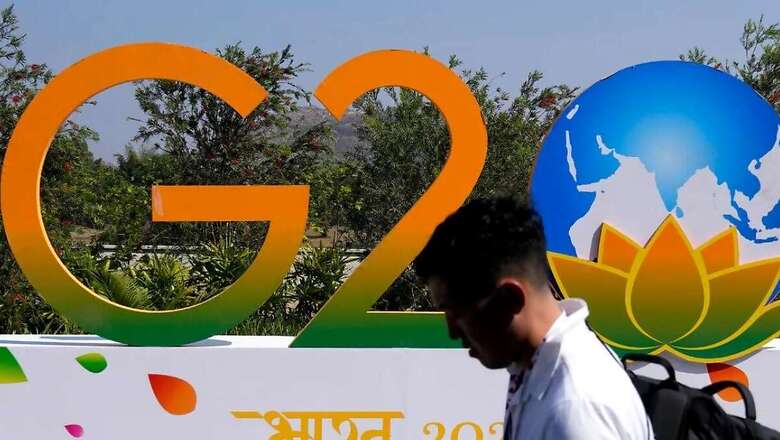
views
The G20 meeting in Ahmedabad is not just about discussions. It is about collaborative action with participation from countries as diverse as Bangladesh, Singapore, Argentina & Laos. Bringing most of the world together for a concerted action on battling pandemics and ensuring basic healthcare is no easy task. India has already signalled its emergence as the voice of the Global South when it comes to health.
In January, Health Minister Mandaviya made it clear: “We will take the voice of the global South to G20 and other international forums as partners in our development journey. Amalgamation of these efforts will ensure health equity at the global level and particularly to Global South.”
India’s three health priorities for G20 have been:
(a) One Health, a WHO-backed integrated approach to optimise the health of people, animals and ecosystems.
(b) Pandemic prevention, preparedness and response accord.
(c) Establishing a Medical Countermeasures Platform to ensure equal access to quality and affordable vaccines, therapeutics, and diagnostics.
(d) And securing consensus for a global digital health initiative.
India a role model
India’s success in the realm of medicine and health has been transformative in the past few decades. India has evolved from being a recipient of global health aid to a frontrunner in providing healthcare solutions.
Pharma powerhouse: India’s pharmaceutical industry has become a major contributor to its global health leadership, and is often called “pharmacy of the world”. India produces a significant portion of the world’s generic drugs. The World Health Organization says almost 60% of vaccines used worldwide are made in India. This was highlighted during the COVID-19 pandemic when India produced and distributed vaccines to almost the entire world.
Skilled talent, affordable healthcare: From advanced surgeries to alternative medicine, Indian doctors have excelled in their fields. The country boasts some of the best hospitals in the world, with state-of-the-art facilities. In most cases, treatment in India is much more affordable. A testament to this is the rise in medical tourism from Africa and West Asia. India has provided training to a large number of medical professionals from third-world countries.
Telemedicine & digital innovations: Rapid growth of technology has enabled India to bridge healthcare gaps. Today, in many remote areas, specialist consultations and follow-up care has been made available through telemedicine. A recent survey says Centre’s flagship eSanjeevani programme, has been availed by 9% of the rural population. India’s CoWIN app has been such a big success that several countries have shown interest in adopting it for universal healthcare.
Global demand for traditional medicine: Traditional medicine systems like Ayurveda & Siddha have received global recognition. The establishment of a Ministry of AYUSH underscores their gaining importance. Global acceptance and adoption of Yoga also cement India’s position as a health leader.
Medical manufacturing: There has been a big push in making India a manufacturing hub for medical devices. This initiative would make India a significant exporter of such affordable devices to the Global South. India is hosting its first medical technology expo in Gandhinagar on the sidelines of the G20 Health Ministers’ meeting to showcase the country’s advancements.
Modi sets examples
Under PM Modi, India has witnessed a series of strategies which have become shining examples for the countries of the Global South to emulate.
- The government has invested heavily in healthcare infrastructure. 22 new AIIMS have been approved across various parts of the country.
- The number of medical colleges has increased by 82% from 387 in 2014 to 704 in 2023.
- When the Covid pandemic struck, it was the PM who took the initiative to offer India’s vaccine manufacturing base to the world.
- India’s feat of delivering 200 crore Covid doses domestically through primary healthcare centres and private hospitals has been a big example. The entire world has been in awe of India’s vaccination program.
- The ‘Heal by India’ Scheme has been launched with the aim of sending Indian doctors, nurses and paramedics abroad to help with medical treatments.
- India’s medical and relief efforts during natural calamities like the Turkey earthquake have been lauded.
- Ayushman Bharat provides free or low-cost health insurance to over 100 million poor and vulnerable families. The scheme has emerged as a role model for developing countries to copy.
India’s ascent as a world leader in health has been the result of its humane approach, manufacturing excellence, technological innovations, and robust policy-making. As the country continues to innovate and adapt, its influence in the global health sector is set to grow, benefiting people worldwide.















Comments
0 comment